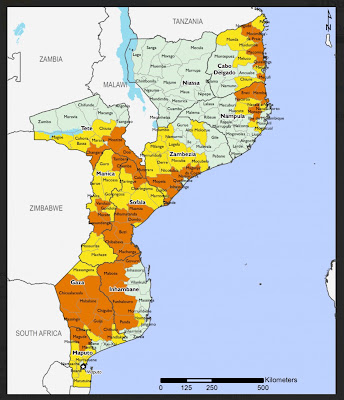In March and April of this year Mozambique was battered by two very powerful cyclones, the power that they packed, both in wind speed and water downpour, was intensified by an ocean that is heating up due to human induced global warming.
Soon after the storms had wrecked their havoc the UN published this piece entitled Mozambique cyclones a ‘wake-up call’ to boost resistance: UN weather agency.
The knock-on effect of these two massive storms are now being seen in the data from the Famine Early Warning Systems Network which has declared a food security crisis in Mozambique for the months October 2019 - January 2020.
The knock-on effect of these two massive storms are now being seen in the data from the Famine Early Warning Systems Network which has declared a food security crisis in Mozambique for the months October 2019 - January 2020.
”As result of cyclones Idai/Kenneth and associated flooding in central and northern regions, drought in southern region, and conflict in Cabo Delgado, most affected households have limited food stocks with below average incomes. Most income sources were disrupted as the majority of households earn income by selling crops and livestock, which were affected by the shocks.”The weather outlook for this period:
”The most likely ENSO phase through February 2020 is neutral while the most likely IOD Phase from August 2019 to January 2020 is positive. As a result, the start of the 2019/20 rainy season in Southern Africa is most likely to start late with seasonal rainfall from October 2019 to March 2020 is most likely to be above average in northern Mozambique; however, in southern Mozambique rainfall will most likely be below average.
“Between December 2019 and March 2020, there is an increased likelihood of a near average number of cyclone strikes in Madagascar and Mozambique.”
As you can see from this situation, climate catastrophes are not sudden and cataclysmic, but the steady progression of events that severely threaten food supplies with no signs of letting up.
If we aren‘t able to keep human caused warming below 1.5°C what is playing now in Mozambique will become the situation in many countries and happen at the same time, making it impossible to deal with. It’s already a dire situation.
Given our current global emissions we are on track for a 4°C warming which will have catastrophic consequences.
Although we are entirely dependent on Government to make the system-wide changes, (eg in South Africa they need to close down ALL coal plants on an accelerated time scale - we as individuals need to urgently begin making better carbon choices - the goal is to decouple from all fossil fuels:
🚘 drive less
✈️ fly less
☀️ use clean energy at home
🛬 avoid foods that have been air freighted
🌱 change to vegan diet on most days
✈️ fly less
☀️ use clean energy at home
🛬 avoid foods that have been air freighted
🌱 change to vegan diet on most days

No comments:
Post a Comment